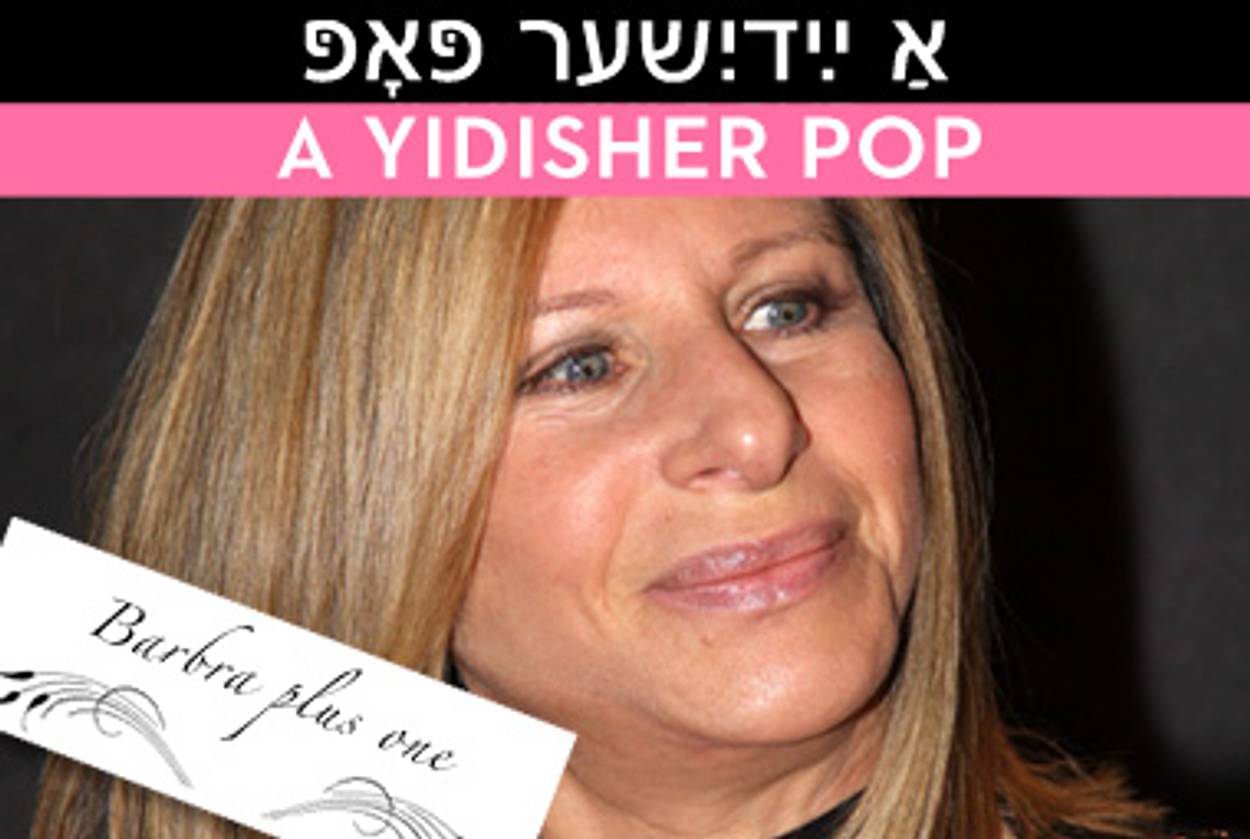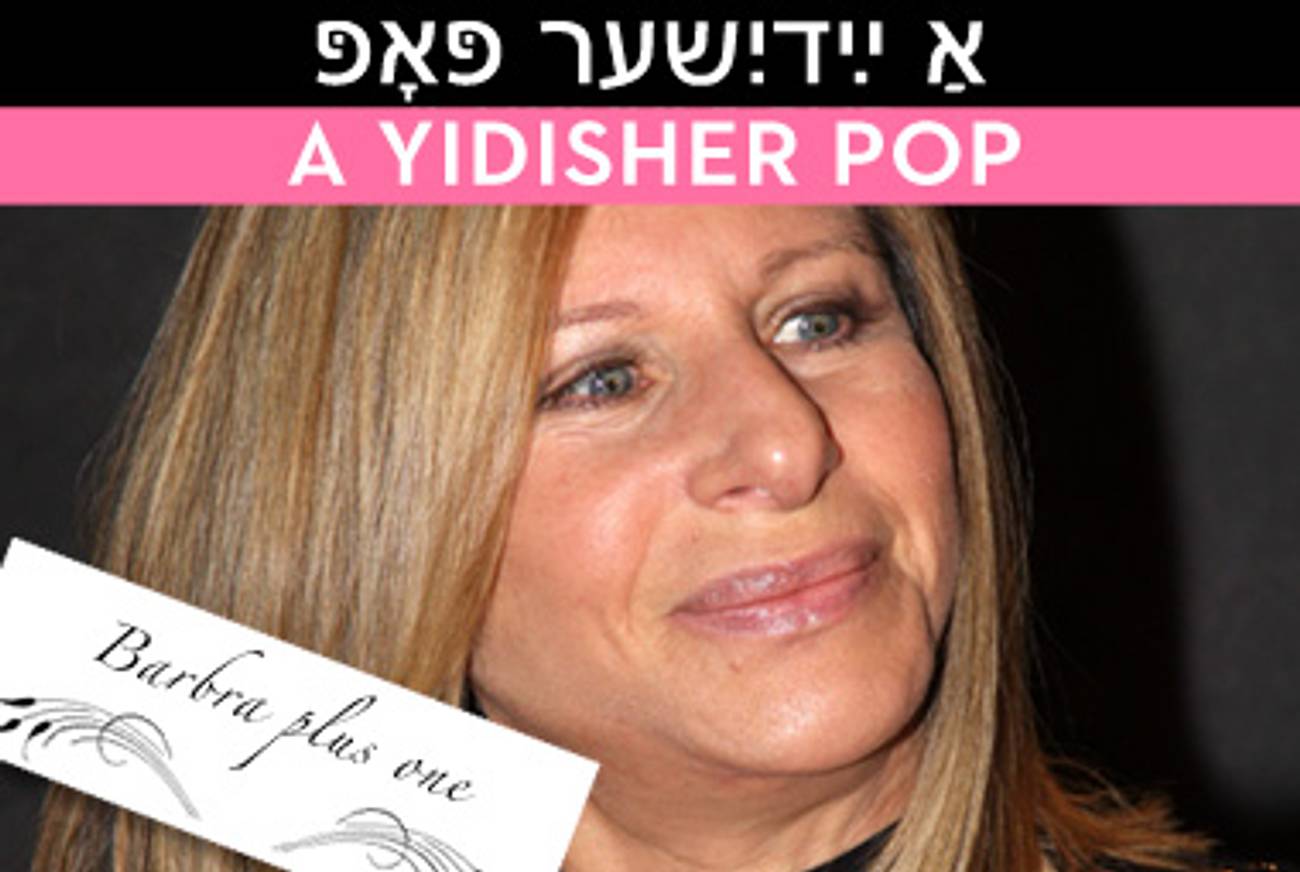A Yidisher Pop
Chelsea Clinton’s wedding and a lesson in Yiddish




Missed our earlier installments? Click here for the “A Yidisher Pop” homepage.
Chelsea Clinton’s wedding is this weekend, and gossips the world over will be gawking at the famous guests. We at A Yidisher Pop are no different. This week’s installment, then, is dedicated to the Wedding of the Year; what, we wonder, might each of the event’s famous guests bring the young couple as a gift?
אָפּראַ זאָגט אַלע געלאַדענע חתונה געסט: “קוּקט אונטער אייַערע געזעסן… דער לעצטער מאָדעל אויטאָ!!!”
Transliteration: Opra zogt ale geladene khasene gest: “kukt unter ayere gezesn… der letster model oyto!!!”
Meaning: Oprah tells the wedding guests: “Look under your seats… It’s a brand new car!!!”
[audio:https://www.tabletmag.com/wp-content/uploads/ayp/04/sounds/oprah.mp3]
פּרעזידענט אָבאַמאַ שענקט אַ צוויי וואָכעדיקע חתונה-נסיעה מיט אַ שיפֿל אין דעם מעקסיקאַנער גאָלף.
Transliteration: Prezident Obama shenkt a tsvey vokhedike khasene-nesie mit a shifl in dem meksikaner golf.
Meaning: President Obama gives a two-week honeymoon on a small boat in the Gulf of Mexico.
טעד טערנער גיט אַוועק לאַרי קינגס מעמוּאַר, “ווי באַנייַט מען אַ ווייַב: ליב האָבן אוּן צוּזאָגן קאָסט ניט (קייַן סַך) געלט.”
Transliteration: Ted Terner git avek Lari Kings memuar, “vi banayt men a vayb: lib hobn un tsuzogn kost nit (kayn sakh) gelt.”
Meaning: Ted Turner brings Larry King’s memoir, “How to renew your wife: Love and promises shouldn’t cost you (too much) money.”
באַרבראַ סטרייַסאַנד לאַד אַלעמען אייַן צוּ איר לעצטן, לעצטן, לעצטן — באמת איר לעצטן — קאָנצערט.
Transliteration: Barbra Straisand lad alemen ayn tsu ir letstn, letstn, letstn — be’emes ir letstn — kontsert.
Meaning: Barbra Streisand invites everybody to her last, last, last — really her last — concert.
Future and Past tense, and good wishes to the couple!
The future tense in Yiddish is built with the verb Veln וועלן + the infinitive. For example, if we were invited to Chelsea’s wedding (it’s not too late!), then:
איך וועל עסן — I will eat
דוּ וועסט טרינקען — You will drink
ער וועט לייענען די כתובה — He will read the Ketubah
מיר וועלן זינגען — We will sing
איר וועט דאַווענען — You will pray
זיי וועלן זיך אַרוּמנעמען — They will hug
The past tense is constructed with one of two auxiliary verbs, conjugated in the present tense: Hobn האָבן , to have, or Zayn זייַן, to be, + past participle. Verbs that take Zayn are mostly motion verbs (to go, to travel); most of the rest take Hobn. The past participle of verbs often requires the prefix Ge גע. For example:
איך האָב געשיקט אַ ליבעסבריוו — I sent a love letter
דוּ האָסט עס באַקוּמען — You got it
ער האָט עס געפֿוּנען — He found it
זי האָט אים געקוּשט — She kissed him
מיר האָבן געוווּסט — We knew it
איר האָט עס איבערגעלייענט — You read it through
זיי האָבן חתונה געהאַט — They got married
איך בין געפֿאָרן צוּ דער חתונה — I traveled to the wedding
דוּ ביסט געלאָפֿן מיט שמחה — You ran happily
ער איז געבליבן פֿאַרחלומט — He remained dreamy
זי איז געווען גליקלעך — She was very happy
מיר זייַנען געגאַנגען צוּזאַמען — We walked together
איר זייַט געשטאַנען בייַ דער חופה — You were standing by the Chupah
זיי זייַנען אַלע געווען פֿריילעך — They were all very happy
So even though we’re probably not going to get an invite from the Clintons, here’s our bit of advice for the newlyweds:
אַז איר קריגט זיך, קריגט זיך אַזוי אַז איר זאָלט זיך קענען איבערבעטן
Az ir krigt zikh, krigt zikh azoy az ir zolt zikh kenen iberbetn
When you fight, fight in a way that lets you make up.
Mazl tov!